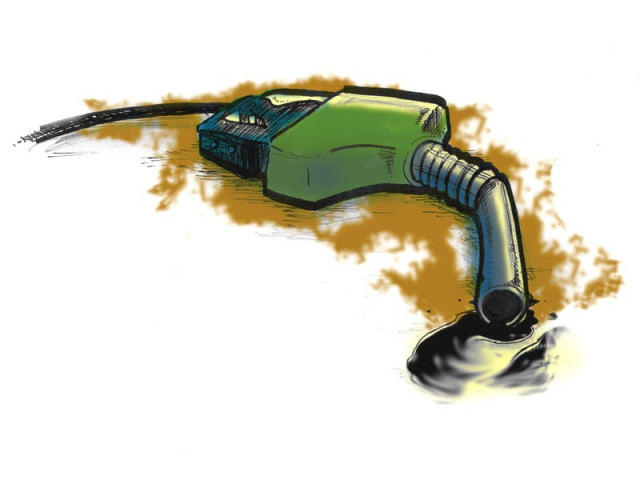Managing the energy crisis: Gas diverted from CNG to industry, power sector
Petrol and diesel prices down, but kerosene prices stay the same as government increases taxes.

As the country continues to struggle with chronic gas shortage, the government on Thursday decided to divert gas from CNG stations to industries and power generation companies though it deferred the decision to increase gas prices for domestic and industrial consumers.
The Economic Coordination Committee of the cabinet decided that petrol stations that sell compressed natural gas (CNG) to cars will see their gas supplies cut off for two days in Sindh and three days in Punjab. Sindh is constitutionally entitled to the right of first use on gas since it produces about 70% of the nation’s total production.
The move is likely to be highly unpopular, which may explain why the government refrained from announcing a gas price increase on the same day.
The meeting was chaired by Water and Power Minister Syed Naveed Qamar in the absence of Finance Minister Hafeez Shaikh, who is currently in the United States on vacation.
The gas saved from rationing to CNG stations will then be supplied to power generation companies in Sindh and Punjab as well industries, especially including fertiliser manufacturers which rely on gas as their raw material. The supply of gas to power producers is likely to at least partially ameliorate the acute electricity shortage in the country.
The policy will now be submitted to the full cabinet for approval.
The ECC also decided that gas supply to two Independent Power Producers (IPPs) would continue for the coming five months while the other two IPPs have been asked to resort to other fuels.
The government will bear the price differential out of taxpayers’ money, a method that started the inter-corporate circular debt in the energy sector, a problem that has financially crippled most energy firms in the country. The policy is also likely to expand the government’s allocations for energy subsidies, which it promised to slash this year.
Deferred decision on gas prices
Even as it acknowledged the rationale behind increasing gas prices, the ECC refused to make a decision on raising them by between 15% and 100%. Sources say that Qamar opposed the increase for CNG stations and fertiliser manufacturers.
The Petroleum Ministry had proposed up to a 15% increase for domestic consumers, up to a 20% raise for commercial and industrial consumers and CNG stations and a 100% increase for the fertiliser sector.
Oil prices go down
The government on Thursday announced a reduction in oil prices, effective from Friday (today), in line with a decline in international oil prices.
Petrol prices are down by about 3.5% to Rs83.71 per litre, light diesel prices down by 1.4% to Rs81.39 per litre and high speed diesel prices down by 2.1% to Rs92.10 per litre. Prices for kerosene oil are expected to remain the same as the government increased taxes on it.
Ramzan Package
The ECC also approved the Ramzan Package which will allow the government to provide subsidised food items to consumers through the state-owned Utility Stores Corporation, the largest chain of retail supermarkets in the country. The subsidy is expected to cost the government Rs2 billion.
Power projects
The ECC also approved the controversial Kohala Hydroelectric Power Project, slated to produce 1,100 megawatts. The project has been awarded to a Chinese company without a competitive bidding process.
The ECC also approved the modification of tariffs by National Electric Power Regulatory Authority (Nepra), allowing gas-based IPPs to claim the full price differential between gas prices and their back up fuels (furnace oil or diesel), for the full duration of the period that the government cuts off their gas supply.
The petroleum ministry was authorised to grand the contract for developing the Uch-II Power Project to Khan Research Laboratories, an organisation most famous for its role in developing Pakistan’s nuclear weapons capability.
With additional reporting by Zafar Bhutta
Published in The Express Tribune, July 1st, 2011.



1733130350-0/Untitled-design-(76)1733130350-0-208x130.webp)















COMMENTS
Comments are moderated and generally will be posted if they are on-topic and not abusive.
For more information, please see our Comments FAQ